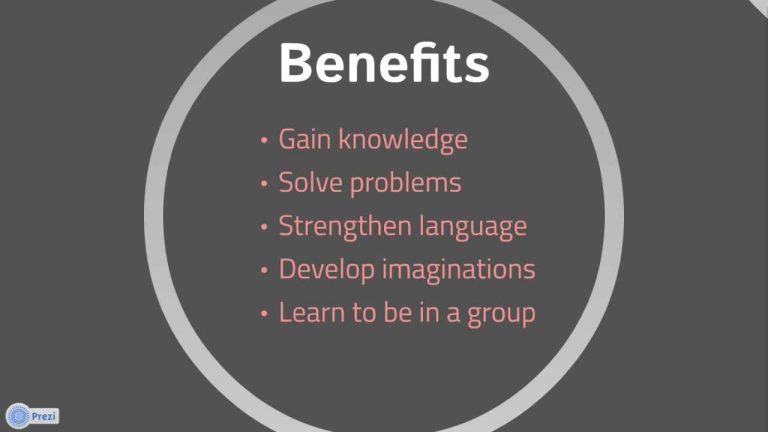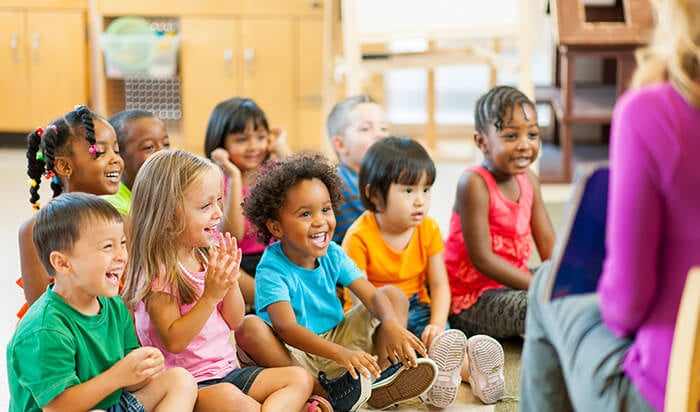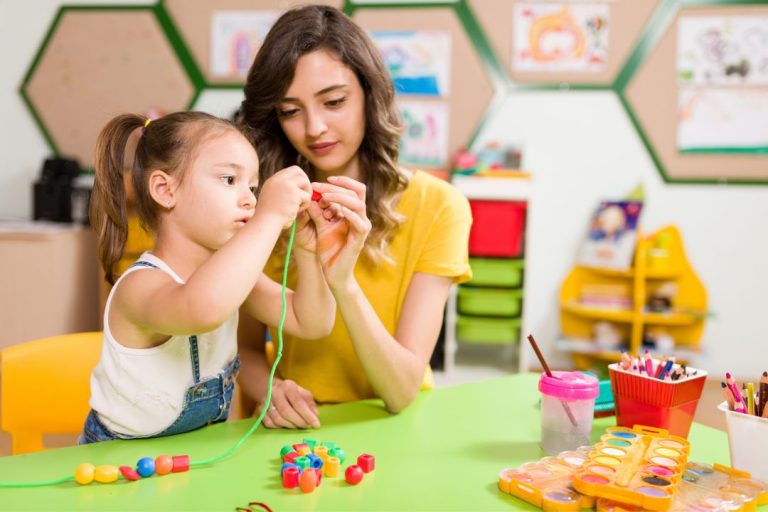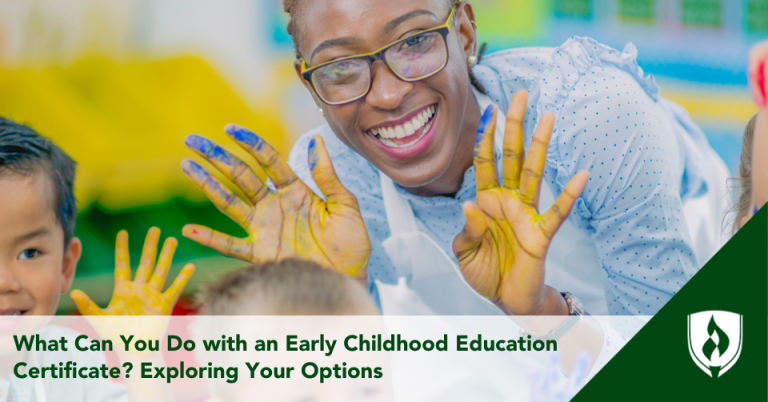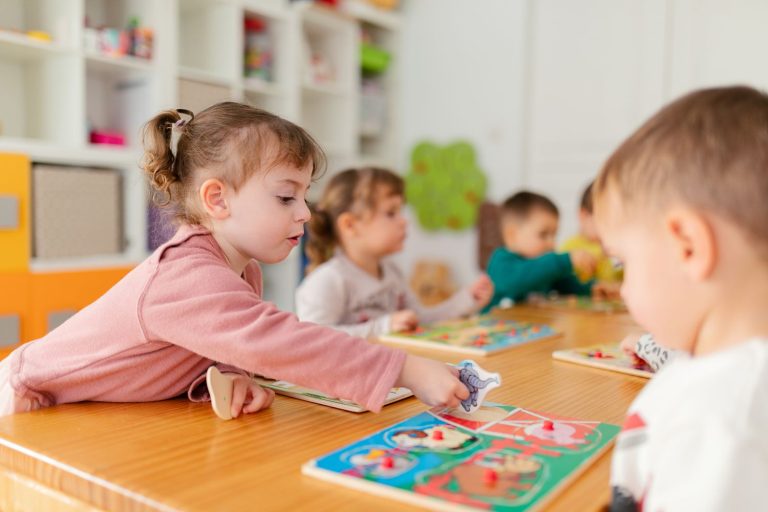What Does Early Childhood Education Mean : Unlocking the Potential

Early childhood education refers to the learning and development of children from birth to around eight years old. It encompasses a range of educational activities and experiences designed to support children’s cognitive, social, emotional, and physical development.
Early childhood education plays a crucial role in laying the foundation for children’s future academic success and overall well-being. Investing in early childhood education has been shown to have long-term benefits, including improved academic performance, higher graduation rates, and better social and emotional skills.
Additionally, it can help reduce disparities in educational outcomes and promote lifelong learning. High-quality early childhood education programs provide children with a safe and nurturing environment, structured learning experiences, and opportunities for play and exploration. By focusing on the unique needs of young children, early childhood education sets the stage for their future growth and success.
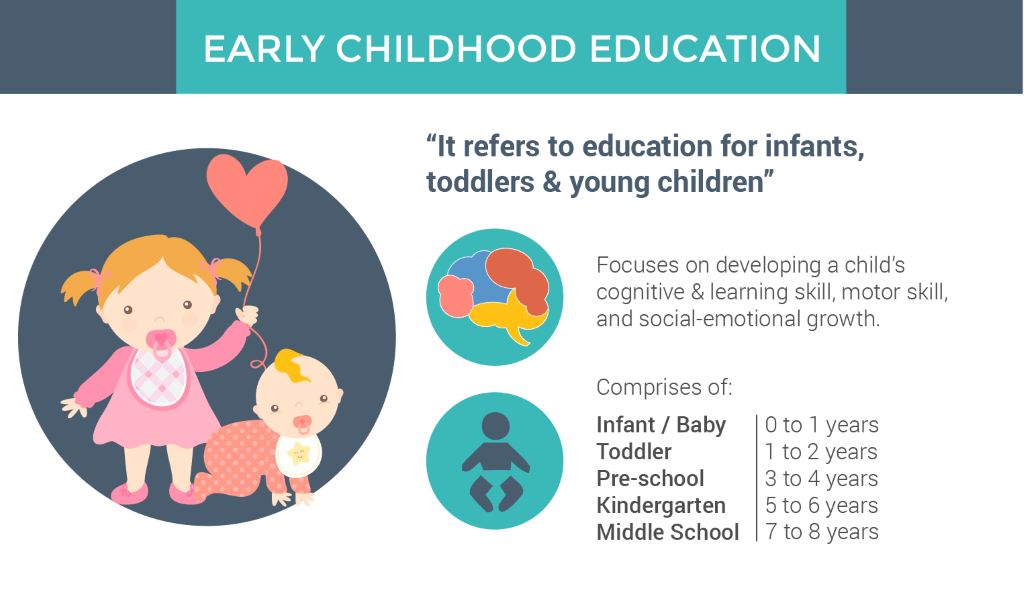
Credit: dldxedu.com
The Importance Of Early Childhood Education
Developmental Benefits
Early childhood education provides a solid foundation for children’s growth and development. It fosters cognitive, social, emotional, and physical development, helping children gain essential skills and knowledge for lifelong success.
Long-term Impact
Investing in early childhood education yields long-term benefits. It significantly enhances a child’s future academic performance, career success, and overall well-being. The positive impact extends far beyond the early years, shaping the individual’s entire life trajectory.
Key Components Of Early Childhood Education
Early childhood education encompasses a range of foundational experiences that are essential for a child’s holistic development. The key components of early childhood education focus on providing a nurturing and stimulating environment that fosters play-based learning, social and emotional development, and cognitive growth.
Play-based Learning
Play-based learning is at the core of early childhood education. It involves hands-on activities, exploration, and imaginative play that allow children to learn through experiences. This approach encourages creativity, problem-solving, and critical thinking in a fun and engaging manner.
Social And Emotional Development
Social and emotional development is a crucial aspect of early childhood education. It emphasizes the development of interpersonal skills, empathy, and self-regulation. Through positive interactions with peers and adults, children learn to express emotions, build relationships, and develop a sense of belonging.
Cognitive Development
Cognitive development in early childhood education focuses on nurturing a child’s mental processes, including attention, memory, and problem-solving abilities. This component encompasses activities that promote language development, early literacy, numeracy skills, and the exploration of the natural world.
Effective Teaching Strategies In Early Childhood Education
Early childhood education involves nurturing and educating children from birth to age 8. Effective teaching strategies in this field focus on play-based learning, hands-on activities, and individualized instruction to support cognitive, social, and emotional development. These strategies lay a strong foundation for lifelong learning and success.
Effective Teaching Strategies in Early Childhood Education Early childhood education encompasses the period from birth to eight years old, a crucial stage in a child’s development. It involves a range of educational activities and experiences designed to foster the cognitive, social, emotional, and physical development of young children. Effective teaching strategies in this context are essential for creating a nurturing and stimulating learning environment that supports children’s growth and prepares them for future success in school and life.Hands-on Activities
Hands-on activities are integral to early childhood education, as they engage children in active learning experiences that promote exploration, creativity, and problem-solving skills. These activities can include sensory play, art and craft projects, science experiments, and manipulative tasks such as building blocks and puzzles. By encouraging hands-on exploration, teachers can enhance children’s understanding of concepts and encourage their natural curiosity and inquisitiveness.Individualized Learning Plans
Individualized learning plans are tailored to the unique needs, interests, and abilities of each child. By assessing and understanding each child’s learning style and developmental stage, teachers can create personalized learning experiences that cater to their specific strengths and areas for growth. This approach allows for differentiated instruction and ensures that each child receives the support and challenges they need to thrive academically and socially.Incorporating Technology
Incorporating technology into early childhood education can enhance learning experiences and provide children with valuable exposure to digital tools and resources. Utilizing educational apps, interactive learning games, and multimedia content can help children develop digital literacy and critical thinking skills while exploring new concepts and ideas. It’s essential to balance technology use with hands-on activities and outdoor play to ensure a well-rounded and developmentally appropriate learning experience. In conclusion, effective teaching strategies in early childhood education play a critical role in nurturing young children’s development and preparing them for a lifetime of learning. By incorporating hands-on activities, individualized learning plans, and technology, educators can create engaging and enriching experiences that support children’s growth and foster a love for learning.Challenges In Early Childhood Education
Early childhood education plays a crucial role in laying the foundation for a child’s future success. However, it is not without its challenges. From accessibility and affordability to ensuring the quality of education and providing adequate support for educators, there are several hurdles that need to be addressed to ensure that every child has the opportunity to receive a high-quality early childhood education.
Access And Affordability
Access to early childhood education programs can be a significant challenge, especially in underserved communities. Many families struggle to find affordable, high-quality options for their children, leading to unequal opportunities for early learning. This lack of accessibility can hinder a child’s development and future prospects. It is crucial to address this issue to ensure that every child has equal access to early childhood education.
Quality Of Education
Ensuring the quality of early childhood education is essential for the holistic development of young children. However, maintaining consistent standards of education across different programs can be a challenge. It is vital to establish and enforce quality benchmarks to guarantee that children receive the best possible education during their formative years. Quality early childhood education sets the stage for a child’s lifelong learning and success.
Support For Educators
Educators in the early childhood education sector often face significant challenges, including low pay, limited resources, and high levels of stress. Providing adequate support for these educators is crucial to ensure that they can create a nurturing and stimulating environment for young children. Investing in professional development, resources, and mental health support for educators is essential for the overall improvement of early childhood education.
Parental Involvement In Early Childhood Education
Parental involvement in early childhood education plays a crucial role in a child’s development.
Importance Of Home-school Connection
A strong home-school connection enhances a child’s learning experience.
Supporting Learning At Home
Parents supporting learning at home reinforces classroom teachings.
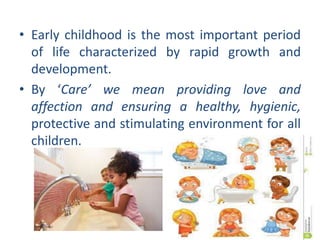
Credit: www.slideshare.net
Innovations In Early Childhood Education
Introduction Montessori ApproachMontessori Approach
The Montessori Approach focuses on child-led learning and hands-on experiences.
Reggio Emilia ApproachReggio Emilia Approach
Reggio Emilia Approach emphasizes creativity, collaboration, and exploration in learning.
Outdoor Learning EnvironmentsOutdoor Learning Environments
Outdoor learning environments promote sensory experiences and connection with nature.
Measuring Success In Early Childhood Education
Early childhood education is a crucial foundation for a child’s future development. Success in early childhood education is measured by a child’s social, emotional, cognitive, and physical growth. It involves creating a nurturing and stimulating environment that supports learning through play and exploration.
Early Childhood Education (ECE) refers to the education of children from birth to the age of eight. It focuses on the development of social, emotional, cognitive, and physical skills in children. Measuring success in ECE is critical in ensuring that children receive the best education possible.Assessment Tools
Assessment tools are used to evaluate a child’s progress in ECE. These tools are designed to measure a child’s skills, knowledge, and abilities. There are many types of assessment tools used in ECE, including observation, portfolios, and standardized tests. Observation is one of the most commonly used assessment tools in ECE. It involves observing a child’s behavior and interactions with others in different settings. Portfolios are another assessment tool that involves collecting samples of a child’s work over time to evaluate their progress. Standardized tests are also used to measure a child’s development, but they should not be the only tool used to evaluate a child’s progress.Tracking Developmental Milestones
Tracking developmental milestones is an essential aspect of measuring success in ECE. It involves monitoring a child’s progress in different areas, such as language, social skills, and cognitive development. There are many developmental milestones that children should reach at different ages. For example, a child should be able to sit up by themselves at six months and say their first words at around one year old. Tracking these milestones can help identify areas where a child may need extra support and ensure that they are on track for their age. In conclusion, measuring success in ECE is vital to ensure that children receive the best education possible. Assessment tools and tracking developmental milestones are essential aspects of measuring success in ECE. By using these tools, educators can identify areas where children may need extra support and ensure that they are on track for their age.Future Trends In Early Childhood Education
Integration Of Steam Education
Early childhood education is embracing STEAM education to incorporate Science, Technology, Engineering, Arts, and Mathematics into the curriculum.
Focus On Inclusive Practices
Ensuring inclusive practices in early childhood education is becoming a priority to cater to the diverse needs of all children.
Professional Development For Educators
Continuous professional development for educators is essential to enhance their skills and keep up with evolving educational practices.
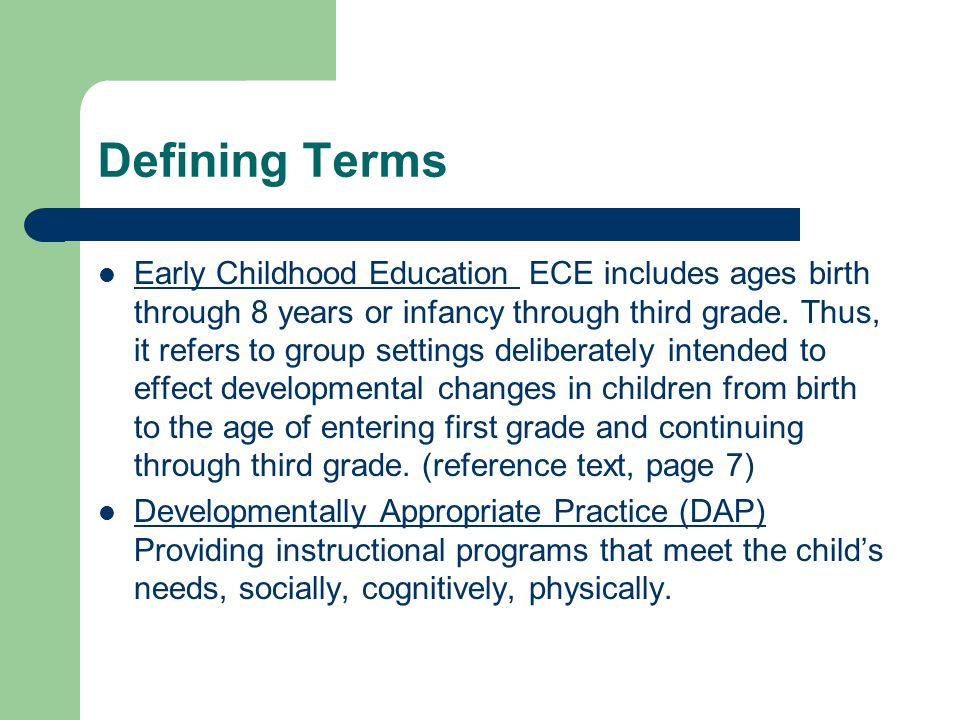
Credit: slideplayer.com
Frequently Asked Questions
What Does Early Childhood Mean In Education?
Early childhood in education refers to the period from birth to around age 8. It focuses on foundational learning and development.
What Is The Meaning Of Early Childhood Educator?
An early childhood educator is a professional who specializes in the care and education of young children, typically from birth to age eight. They create and implement developmentally appropriate activities and curriculum to promote social, emotional, physical, and cognitive growth in children.
What Is The Difference Between Preschool And Early Childhood Education?
Preschool focuses on play-based learning for children aged 2-5, while early childhood education covers a broader range of educational activities for children up to age 8.
What Is Learning In Early Childhood?
Learning in early childhood involves acquiring knowledge, skills, and behaviors through exploration, play, and interactions. It lays the foundation for future development and academic success.
Conclusion
In essence, early childhood education lays the foundation for lifelong learning and success. Investing in quality education for young children is crucial for their overall development. By providing a nurturing and stimulating environment, we empower future generations to reach their full potential.
Let’s prioritize early education for a brighter tomorrow.
Lorem Ipsum is simply dummy text of the printing and typesetting industry. Lorem Ipsum has been the industry’s standard dummy text ever since the 1500s, when an unknown printer took a galley of type and scrambled it to make a type specimen book.


